A one-stop maritime online platform where vessels, marine equipment and services can be sourced easily and cheaply. A remote and interactive farming platform for users to learn and enjoy agriculture from anywhere, at any time, through smart devices. An augmented reality toolkit which allows surgeons to see inside their patients virtually to make image-guided surgeries safer and faster.
These are some of the ideas put forward by the 36 finalist teams at the recently concluded 9th Lee Kuan Yew Global Business Plan Competition organised by the SMU Institute of Innovation and Entrepreneurship (IIE).
Launched in March this year, the biennial Competition was themed 'Smart City', and called for innovative proposals that address the opportunities and challenges a smart city faces in the areas of health, living, and services.
The 36 finalist teams were selected from a record of 550 submissions from over 300 universities in 68 countries, and hail from leading universities in Asia, Europe and the US. This year’s competition also saw a record number of organisations, judges and mentors supporting the event.
The teams travelled to Singapore on an all-expenses paid trip during the competition week of 11-15 September. They presented their business plans in the Category Finals on 13 September, and the top six teams (i.e. two each from the Health, Services and Living categories) competed in the grand finals in the afternoon of 14 September.
At the prize presentation ceremony and dinner on 14 September, SMU President Professor Arnoud De Meyer said, “The response to the competition this year has exceeded our expectations. In the last edition, there was greater participation from the emerging Asian economies; this year, many more entries were received from beyond this region. The enthusiastic response by so many universities from all over the world showed that the Lee Kuan Yew Global Business Plan Competition has gained traction with and has earned a sound reputation among the Institutes of Higher Learning far beyond this region. It also shows that the theme of this year’s competition has particular resonance with tertiary students across the globe. I also look forward to seeing some of their ideas come to fruition here in Singapore and around the world.”
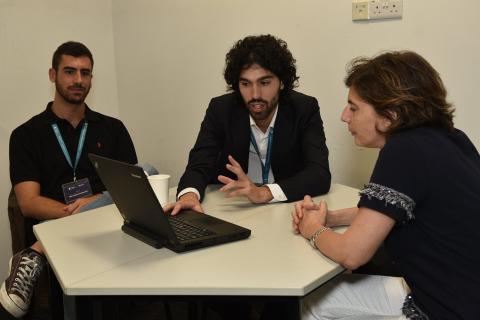
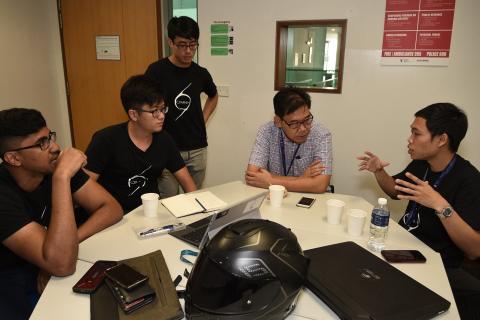
[Caption: The finalist teams received face-to-face coaching from business mentors and serial entrepreneurs.]
Team SpectraPlasmonics from Queen's University of Canada emerged as winners and took home the grand prize of $100,000 after beating five other finalists to the top prize. The team had impressed the judges with their cost-effective solution that aids ultrasensitive chemical detection in areas of food and water contamination, and provides defence against illegal drugs and terrorism agents.
In addition to the grand prize, the team also won several other prizes, including Wavemaker Partners Smart City Investment Grand Prize of $50,000 and IIE Smart Living Outstanding Award of $25,000.
Mr Tyler Whitney, a member of Team SpectraPlasmonics, shared that the idea was originally mooted with bio-sensing in mind, which is to detect early markers of deadly diseases such as cancer. Going forward, the team intends to set up more product trials and demos so as to get this technology into the hands of others as soon as possible in order to obtain valuable market insights, establish legitimacy for the product, and help push the team towards a product launch.
Another multiple award winner was Team Elephant Chain from Zhejiang University of China, which developed a consortium blockchain platform for enterprises to build blockchain applications. Besides winning the Wavemaker Partners B2B Investment Prize of $50,000, the team also walked away with the IIE Smart Services Outstanding Award of $25,000, and the IIE Acceleration Award of $20,000.
Dr Butian Huang of Team Elephant Chain said that the team decided to focus on blockchain technology in finance because they believe the technology can help make every transaction transparent, traceable and immutable.
“This is the first time we are participating in a global competition, and it has been an amazing and challenging experience for us. We have learned a lot from our mentor as well as from the other teams and made good friends with them. It was also great to be able to meet the judges from the world’s leading VCs, their deep knowledge and experience of different industries were very impressive,” said Dr Huang.
The panel of judges for the Grand Finals were Michael Seibel, CEO of Y Combinator; Shirley Wong, Managing Partner of TNF Ventures; Professor Lui Pao Chuen, Advisor of National Research Foundation Singapore; David Su, Founding Managing Partner of Matrix Partners China; Paul Santos, Managing Partner of Wavemaker Partners; Chong Chiet Ping, Managing Partner of Green Meadows Accelerator; and Robert Chew, Chairman, Information Systems and Technology Sub-Committee of Alexandra Health System.
The finalists were evaluated on Innovativeness and Impact of Business Idea, Commercial Feasibility, and Capability to Execute.
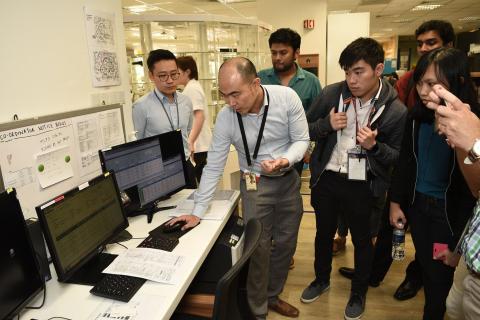
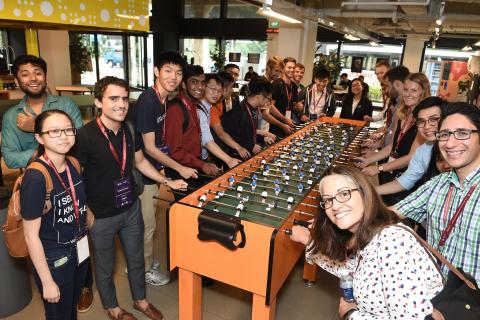
[Caption: The finalist teams visited lyf@SMU (above), ST Engineering Open Lab, Build Amazing Startups Here (BASH), and Tan Tock Seng Hospital (top) during their week-long stay in Singapore.]
One highlight of this year’s competition was the week-long programme with experienced mentors and industry partners to enable the finalist teams gain insights into Singapore’s innovation and entrepreneurship ecosystem. Places the teams visited included lyf@SMU, ST Engineering Open Lab, Build Amazing Startups Here (BASH), and Tan Tock Seng Hospital.
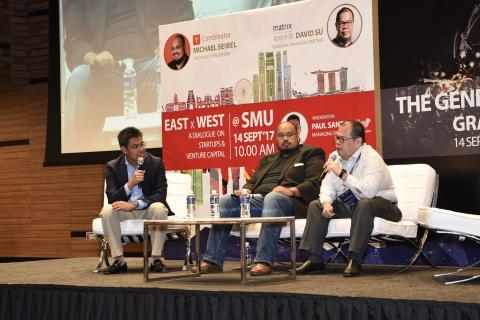
[Caption: Paul Santos (left), Managing Partner of Wavemaker Partners, moderated the fireside chat with David Su (right), Founding Managing Partner of Matrix Partners China, and Michael Seibel (centre), CEO of Y Combinator.]
Another highlight was the events held in conjunction with the Competition. A fireside chat featuring David Su, Founding Managing Partner of Matrix Partners China, and Michael Seibel, CEO of Y Combinator, was held in the morning of 14 September during which they discussed about startups and venture capital. The session was moderated by Paul Santos, Managing Partner of Wavemaker Partners. A number of startup founders who are interested in joining Y-Combinator pitched their business ideas at the “1-1 Office Hours with Michael Seibel” on 15 September.
Wilmar International Limited was the main sponsor of this year’s competition, and Wavemaker Partners was the platinum sponsor.
[Caption: Team SpectraPlasmonics from Queen's University of Canada was the big winner at the 9th Lee Kuan Yew Global Business Plan Competition. With them on stage were Mr Hau Koh Foo (extreme left), Director of Institute of Innovation and Entrepreneurship at SMU; Mr Adrian Chan (2nd from left), Senior Partner at Lee & Lee; SMU President Professor Arnoud De Meyer (5th from left); Mr Paul Santos (3rd from right), Managing Partner at Wavemaker Partners; Ms Shirley Wong (2nd from right), Managing Partner of TNF Ventures; Professor Gerard George (extreme right), Dean of Lee Kong Chian School of Business, SMU.]